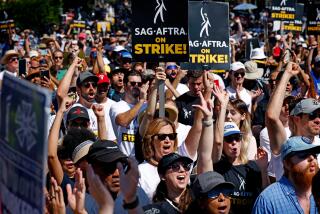As SAG-AFTRA strikes, video game companies hit back
Close to 350 actors took their grievances to Electronic Arts in Playa Vista on Monday, marching and chanting for more pay and better working conditions for performers who do voice-over and motion-capture work on blockbuster video game titles.
The picket line was the latest signal from SAG-AFTRA that it is preparing for a long fight with several prominent game companies, as both sides have failed to agree on the union’s demand for residual-like payments that are commonplace in film and TV but not in the gaming industry.
SAG-AFTRA also wants employers to reveal the titles of games when hiring actors, but companies including Activision Blizzard, Electronic Arts and Take Two Interactive are arguing that level of transparency is impossible and could put them at a competitive disadvantage.
On Monday, the video game companies hit back, accusing SAG-AFTRA negotiators of failing to communicate the most recent proposal to its members before officially calling the strike Friday.
“If I was a performer, I would want the opportunity to say yes or no,” said Scott Witlin, a lawyer at Barnes & Thornburg and chief negotiator for the gaming companies, during a news conference Monday afternoon. He said the initial strike authorization took place a year ago and that the union membership “hasn’t been heard about what they think about our proposal.”
SAG-AFTRA has stated that its negotiating committee has the authority to call a strike against the companies.
“We know where our members stand and we’ll put a deal in front of our members when we have one that our committee can recommend,” said Jennifer Hale, a voice actor who has performed in numerous games including the “World of Warcraft” and “Halo” series. She is also part of the union’s negotiating team.
“What they’ve said is disingenuous and misleading,” Hale added. “It’s disappointing to see them twisting the facts.”
Witlin said that paying residuals to actors would be “fundamentally unfair” to the programmers and developers who put in far more man-hours on a game and who aren’t compensated based on a game’s performance.
SAG-AFTRA is asking for a bonus compensation structure that would allow actors to receive additional payments for every 2 million copies or downloads sold, with a cap at 8 million sales.
The video game companies have alternately proposed a 9% wage increase, which would accelerate the 3% annual increase sought by SAG-AFTRA over a three-year period. They were also offering additional upfront compensation of as much as $950 per game based on the number of sessions a performer works on a particular title.
The differences between the proposals are “negligible” and “not worth striking over,” Witlin said.
But SAG-AFTRA said that companies are scared of paying residuals because “it opens up a can of worms of sharing prosperity,” Hale said.
During last week’s negotiations, the video game companies said they were open to revealing a game’s “code name” — or working title — to actors during the hiring process. But it said the union hasn’t accepted the compromise.
Meanwhile, SAG-AFTRA plans on keeping up the pressure. The union said it is reaching out to other video game firms who aren’t part of the 11 companies engaged in the negotiations in an effort to build a groundswell of support in the industry around its proposals.
“We have other actions planned but not scheduled, including rolling picket lines,” union spokeswoman Pamela Greenwalt said.
Witlin said there are no further negotiations.
Twitter: @DavidNgLAT
ALSO
Park Hyatt hotel is set to join the downtown L.A. building boom
Wall Street worries that regulators will sink AT&T-Time Warner deal
Big banks roll out Zelle, a money-transfer app to take on Venmo
More to Read
From the Oscars to the Emmys.
Get the Envelope newsletter for exclusive awards season coverage, behind-the-scenes stories from the Envelope podcast and columnist Glenn Whipp’s must-read analysis.
You may occasionally receive promotional content from the Los Angeles Times.







